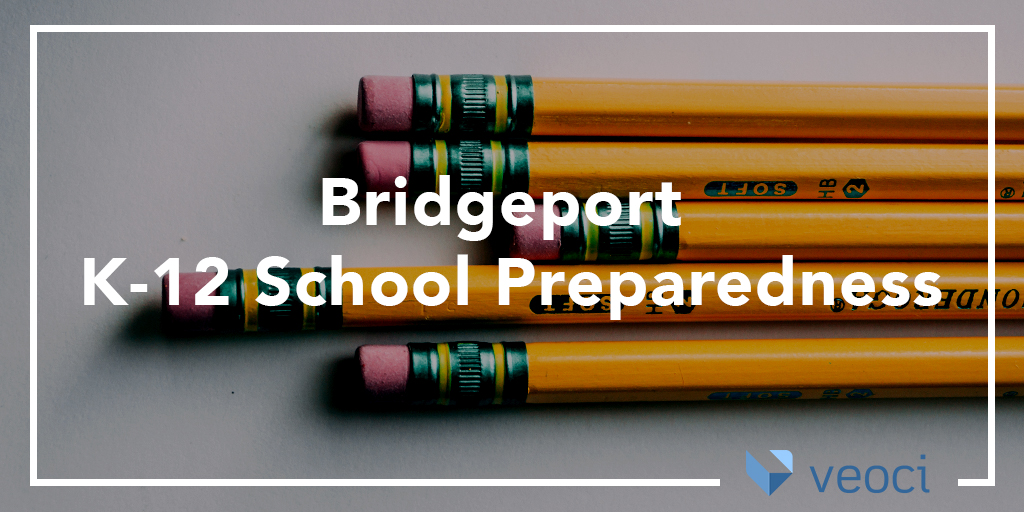Keeping 23,000 Students Safe
Preparation isn’t just a one-time deal. An emergency plan can’t just be written down and placed at the back of a file cabinet. It needs to be constantly reviewed, updated, and very importantly, tested. Scott Appleby, CEM, Director of OEMHS Office of Emergency Management & Homeland Security with 24 years experience, lives and breathes preparation. Scott recently did a webinar to share how he and his team utilize Veoci to help make sure that the students, faculty, and administration of the Bridgeport school system stay safe and prepared for any possible incident. Here’s a brief rundown of some of the major points covered in the webinar in case you missed it.
Drills, Drills, Drills
After the tragedy in Newtown, the state of Connecticut implemented a public act requiring all schools to create emergency plans and consistently hold drills. Drills must cover a broad scope of hazards including fires, active shooters, bomb threats, and lockouts. Each school is required to do at least 10 drills per year, but many do more. The majority of the drills are unannounced, for a more realistic approximation of an incident. “We do drills during testing, science fairs — it doesn’t matter. We need people to know that these events can happen no matter what,” Scott stated. In total, Bridgeport schools do about 600 drills in a year. With 38 schools and over 23,000 students in the Bridgeport school system, there is a massive amount of important information Scott’s team needs to keep track of regarding drills.
“We do drills during testing, science fairs — it doesn’t matter. We need people to know that these events can happen no matter what.”
That’s where Veoci comes in. The Emergency Management team looked towards Veoci as a way to hold schools accountable; to make sure they’re following the law, and actually doing the drills they say they’re doing. Each school documents their drills in Veoci, giving Scott and his team the opportunity to gauge if the administration has a solid understanding of the plan and where they can improve and revise for the future.
“All Emergency Managers understand this: we don’t test people, we test plans,” Scott said.
Tabletop Exercises
Tabletop exercises are another key aspect of keeping schools safe. They’re designed to test every single aspect of a plan from the inside out, while making sure school and emergency management officials know exactly what they’re responsible for in the event of a crisis. Scott says he got the idea to use Veoci for tabletop exercises from another Veoci best practices webinar. Using Veoci, they can pre-program notifications, or injects, to occur at a specific time or in increments during a tabletop drill.
“Veoci helps everyone in the room get the real feel of an actual incident taking place.”
Before, tabletop drills would consist of a facilitator reading the injects off of a list. But Scott says using Veoci instead helps “everyone in the room get the real feel of an actual incident taking place.” He says it’s not only helpful to see messages like they would appear during an emergency, but it’s more engaging as well. The team has future plans to incorporate pictures and video message injects for further realism.

Sharing Sensitive Information
Information regarding student safety needs to have top-notch security. Veoci’s controllable environment lends itself well to the task, Scott explained. Veoci Rooms can be restricted to only those who need access. For example, Bridgeport law enforcement has their own room in Veoci, where they can share state or nationwide threats, school emergencies, or photos of suspects.
Scott says that sharing suspect photos with surrounding communities is extremely helpful as it allows law enforcement to be aware of possible threats in the area. The law enforcement-only restriction ensures sensitive information isn’t shared publicly, which could compromise investigations. However, school administrators can be easily added during incidents if needed.
Between Schools
Administrators from different schools also have a place in Veoci where they can share data and best practices for handling emergency situations. While school officials don’t always have the time to meet in person, discussing how different schools deal with similar situations, even virtually, helps everyone’s security improve. In the end, constantly bettering school safety is the main goal.
About Scott Appleby
Scott T. Appleby, CEM the Emergency Management and Homeland Security Director for the City of Bridgeport in Connecticut with over 24 years of experience and specialization in emergency management and homeland security, incident management, operations, planning, response, recovery, exercise design and evaluation for all hazards.He has received all of his professional training from FEMA’s Emergency Management Institute, Department of Homeland Security, National Emergency Response and Rescue Training Center (NERRTC)/Department of Justice (DOJ)-Office of Domestic Preparedness (ODP) and many other key emergency management & homeland security training agencies. He obtains a Certified Emergency Manager certification from the International Association of Emergency Managers and is a two-time recipient of the Northeast States Emergency Consortium (NESEC) Emergency Manager of the Year award.
Veoci offers a wide range of solutions. See what Veoci can do for your organization today.








